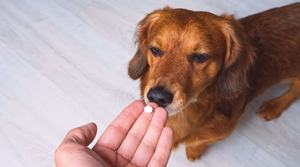This article has been medically reviewed by Dr. Joanna Woodnutt, Veterinarian, MRCVS.
Even if you have been around them for years, dogs can be puzzling creatures to look after on a daily basis.
For example, what does it mean if your dog is gagging but does not throw up? After all, it would be normal for a dog to vomit after gagging - so is it a problem if your dog isn't throwing up?
The main question people want answered when asking these types of questions about what is known as 'unproductive' gagging is if there is cause for alarm or not.
And as is the case when it comes to many dog behaviors, the answer is not a clear-cut one.
While you should always pay attention if your dog is exhibiting strange behaviors like this, panic is not the answer.
Gagging and not throwing up can be a serious problem, but in some cases may be harmless.
Whatever the case, pet parent panic can only make the situation worse.
To help you better understand why your pup is gagging but not throwing up, and what you can do to help, we are going to take a closer look at the issue here.

Dog Gagging vs Retching vs Dry Heaving
All these terms may seem, on the surface, to mean the same thing, but the fact is that two of the three terms do indeed mean different things.
When your dog tries to vomit but nothing comes up, this is known as dry heaving.
It will often look as though they are experiencing a whole-body spasm, beginning in the stomach and undulating out the throat.
Retching and dry heaving are essentially the same thing, simply two different terms for it.
Gagging, on the other hand, is exactly what it sounds like: your dog's throat is spasming, making breathing and swallowing difficult for them.
It has the same appearance and sound as if it were a human experiencing similar symptoms.
However, it's not the same thing as choking, which is when the airway is blocked.
Why is My Dog Dry Heaving or Retching?
While it sounds very concerning, especially if you have not heard them do it before, dry heaving is not always serious.
However, there's one major cause of dry heaving in dogs that you should be aware of. Gastric Dilation Volvulus (GDV) is a life-threatening situation where the stomach fills with gas (bloat) and then twists. This leads to retching without vomiting, pain, collapse, and a swollen stomach.
If you notice these signs you should call the nearest open veterinarian immediately! Dogs with GDV can only survive if they have surgery, and the longer it is left the less good the prognosis.
Of course, sometimes causes of dry heaving and retching are much less of a concern. Dogs might retch because they feel nauseous.
They may have eaten too fast, eaten too much, or spent a little too much time in the sun.
The nausea could be due to an underlying illness, but most of the time it's just a passing thing that your pup will recover from in time.
Some dogs will also retch if they are very hungry. You are most likely to notice this first thing in the morning, or in dogs that are fed once a day.
This can obviously be solved by giving them something to eat, but you should avoid them eating too fast and making their distress even worse. Giving them a small amount at first is sensible, especially if you are not sure if they're nauseous.
Dry heaving can occasionally be a sign of something more sinister. Aside from the GDV that we've already covered, there are other causes of retching in dogs you should be aware of.
Toxin exposure or ingestion of an irritant can cause dogs to retch if the back of their throat is swollen - this can become life-threatening and you should consider a veterinary visit if this is possible.
Retching might also be the first symptom of a bee or wasp sting, a foreign object stuck in the throat or gullet, or a bad tooth.
How to Stop a Dog Dry Heaving?
While the occasional dry heave in a dog is harmless, dry heaving constantly or on a regular basis can be more concerning than actual vomiting. This is because the act of vomiting often expels whatever is causing the problem, whereas dry heaving does not.
Constant dry heaving without vomiting is a sign of GDV and should be treated as an emergency. You should call a veterinarian for any dog that is continuously dry heaving or retching - your vet can help rule out GDV or foreign objects, and give your dog treatment to stop them retching.
Multiple failed attempts to vomit up something bad can damage their stomach or throat, so getting your pet seen to sooner rather than later will not only prevent further problems, it will make them more comfortable too.
While lots of other signs and symptoms may or may not accompany frequent retching, here are some of the more common ones that should be a cause for some concern and consulting your vet:
- Fever
- Restlessness
- Sudden lethargy
- Constant sneezing
- Drooling
- Pale gums
- Constant lip licking
- Shallow or labored breathing
- Foaming at the mouth
Why is My Dog Coughing and Gagging?
Seeing your dog gag can be very scary, as it is easy to think that they are choking and are in serious danger.
Gagging is not choking though, and is usually caused by a laryngeal inflammation rather than an obstruction of their airway.
There are all kinds of relatively harmless reasons your pup may gag.
Irritants
Exposure to smoke or other irritants, particles of food inhaled rather than eaten and more can all be reasons for relatively harmless gagging.
Your dog may gag when he barks due to a sore, irritated, and dry throat caused by excessive barking or howling.
Laryngeal Paralysis
Laryngeal paralysis is a condition that affects some dogs.
This means that their larynx does not close completely in the way it should, allowing food and other debris to enter their airway and cause them to gag.
While this condition can affect any dog, some breeds are more prone to this than others, including Golden Retrievers, Labradors, Great Danes and Bernese Mountain Dogs.
Kennel Cough
Gagging can sometimes be due to kennel cough, although this is usually easy to spot as the cough associated with this infectious disease is normally called a 'goose honk'.
It is caused by highly infectious bacteria and gets its name from the fact that this is easily spread in boarding kennels and shelters where the space and ventilation is often not as good as it is in the standard home.
While not fatal if treated properly, kennel cough is very infectious, so if you suspect your pup may have been exposed try to isolate him from other canine (or feline) companions until he is seen by a vet.
Other Respiratory Infections

Brachycephalic breeds that typically have shortened skull bones with a smooshed face are; boxers, pugs, french and english bulldogs, shih tzus etc.
Finally, if your dog is a member of a short-snouted or brachycephalic breed (brachy = shortened and cephalic=head), they may gag due to their anatomy. These dogs often have long soft palates that dangle into their throat, causing irritation.
They are also more prone to all kinds of respiratory infections, because of that short, stubby nose, and these may cause him to gag more often.
Brachycephalic breeds that typically have shortened skull bones with a smooshed face are, boxers, pugs, French and English bulldogs, boston terriers and shih tzus, amongst others.
How to Stop a Dog Gagging?
Again, the first thing not to do is panic. We've said that a lot here, but it really is essential.
Banging your dog's back, or grabbing at their head won't help them and may cause more harm than the behavior itself.
As we also mentioned earlier, some gagging is no real cause for concern.
If smoke from a cigarette, a fireplace or a bonfire is bothering them, move them away and the gagging will often stop.
If they have have just eaten and are now gagging, it may be that they've inhaled a small amount or swallowed too much at once, and it is causing them to gag. This often happens when dogs eat too quickly.
In this case, speak to your vet about measures to slow your pup's eating down, which may include more frequent mealtimes or the use of a slow feeder at mealtimes.
Some pups do fine being fed twice a day, but others will feel like they are being starved if made to wait too long between meals and will gobble their food down- and often retch after doing so, as a result.
Fast eating can increase the risk of GDV, so it's important to get this under control.
In the case of other possible serious causes of gagging, guesswork is rarely a good idea.
If there is any possibility your pup could have ingested something poisonous, they'll need help as soon as possible.
Bear in mind that things that are not poisonous to humans can be so to dogs, including things like chocolate, onions, certain houseplants and common household cleaners.
Take Note
As is the case for humans, one of the best things you can do immediately is call the ASPCA Animal Poison Control Center at (888) 426-4435. They are open 365 days a year, 24 hours a day and can provide immediate, expert advice right away (and the service is free).
If your pup gags often, you should discuss the issue with your vet. However, most one-off gags are nothing to worry about and you don't need to rush to the vet every time your dog is gagging.
If your dog appears to be in good health, and hasn't had access to dangerous substances, it's usually safe to just keep an eye on him and call the vet it continues or worsens.
My Dog Sounds Like He Has a Hairball. Should I Worry?
Hairballs are very common in cats.
Cats, who are very fastidious creatures, wash themselves frequently, often several times a day.
Hair is frequently swallowed as a result of this constant licking. The hair will occasionally form into a ball, which the cat will vomit back up.
Hairballs are more common in long-haired cats, but they can occur in any breed.
Hairballs in dogs are far less common, simply because dogs just don't do all that constant washing stuff that their feline counterparts do.
They may attempt to wash themselves if they get very dirty, but other than that they really don't bother.
So, assuming that a dog has a hairball if he gags like your cat is often an assumption that is off the mark. It's far more likely that he is gagging for one of the other reasons listed above.
That being said, dogs can get hairballs in some cases and these can cause problems, but this is rare.
Conclusion
Getting to the bottom of why your dog is gagging and not throwing up is important.
While the occasional gag or retch isn't a concern, repeated dry heaving, retching or gagging should trigger a visit to your veterinarian as soon as possible.
The most important cause of retching without vomiting to be aware of is GDV, an extremely serious condition that will become fatal within hours if not treated.



